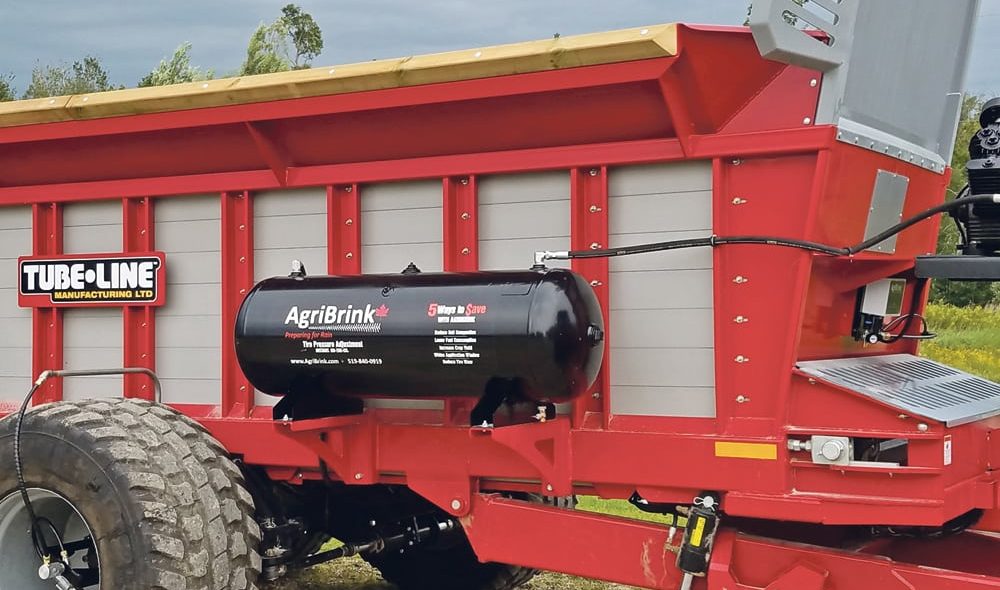Putting big shoes on little feet can help spread out the weight of large farm equipment. An Ontario company that has been varying tire pressures for several years feels its tools can do well out West as well.
Agribrink is best known in the manure management area of the industry, helping farmers and contractors carry big loads on roads and into the field and then managing empty machines to help them get home again. But in recent years, producers have been adding variable tire inflation to their self-propelled sprayers and fertilizer spreaders as they make choices about soil compaction.
“And they look at long transports between fields, better control of their equipment on the road and fuel efficiency. Lots of reasons outside of agronomy,” said Agribrink’s Paul Roper.
“They are putting them on combines to leave less of an impression in the field and make the machines easier to manage on the road,” he said.
He said soil compaction is becoming a better-understood issue with producers. In some cases in the American Midwest and in Central Canada, producers using manure are specifying that contractors must use a tire-pressure management system when travelling on their fields.
Tractor manufacturers such as Claas and Agco’s Fendt make the central tire inflation systems as options on their equipment.
From grain carts to potato and silage wagons and manure spreaders, many machines hit the fields weighing more than producers might imagine. These will leave an imprint that goes deeper than the slight field ruts might imply. Improved traction with less soil compaction has made central tire inflation systems like Agribrink a growing choice on producer’s sprayers and can provide a competitive edge for application contractors. | Agribrink photos
Large Challenger tractors, too, have been offered with variable-inflation system options when paired with Michelin rubber, and last year tire and wheel maker Trelleborg showed off its prototype designed for a tractor.
Being able to quickly and affordably retrofit farm equipment for this technology is a big advantage for a Canadian company, said Roper.
“These machines are big investments. Heck, the tires alone are big investments,” said Roper ahead of attending the Ag in Motion farm show planned for just north of Saskatoon in the third week of July.
The company has eight dealers with 28 locations in Ontario, and Roper said it plans to expand into Western Canada this year.
The variable pressure units are installed on some western Canadian equipment already, but a dealer network is needed to support the technology.
Agribrink uses a geo-referenced controller that manages the tire pressures and gathers data about pressure, speed and location.
The system can deflate and inflate tires rapidly, meaning that unlike some systems the machines aren’t stopped waiting to enter or exit fields.
Developed by Ontario hog producer Jake Kraayenbrink about seven years ago, after he had been seeking a variable-tire-inflation solution for his farm, the system can drop its pressure, at the individual tire’s valve rather than flowing air through hoses and a central valve, in about 20 seconds, depending on the tire size and desired pressures.
Kraayenbrink sought systems in Europe to bring back home, but found companies weren’t keen to market them into North America.
Farm tires, unlike the better-known large truck variable-pressure systems, run on high volumes of air and low pressures.
The footprint of a farm tire can safely be increased by up to 70 percent in many cases, reducing soil compaction and cutting fuel use.
“We are finding about a 15 percent reduction in fuel use and some contractors (who apply fertilizer) are getting an extra 18 months out their (high clearance) equipment tires, where the sidewalls tend to fail first,” said Roper.
The operator pre-sets the upper and lower pressures and then hits the switch once it’s time to drop or raise pressures in carts, tractors or application equipment.
With some of the latest low-pressure tires, pressures in the field can be well below 10 pounds per sq. inch, providing a big footprint that is field friendly, but not as good for a 20 kilometre road trip to the next field.
“The controller also provides a great record of use if you need to make a tire warranty claim. It doesn’t happen often, but our customers say it’s good information to have in your back pocket when you do,” said Roper about the Moorefield, Ont., built tools.
The Agribrink Automatic Air Inflation System can be found at the Penta booth during the AIM show for producers interested in knowing more about it.


